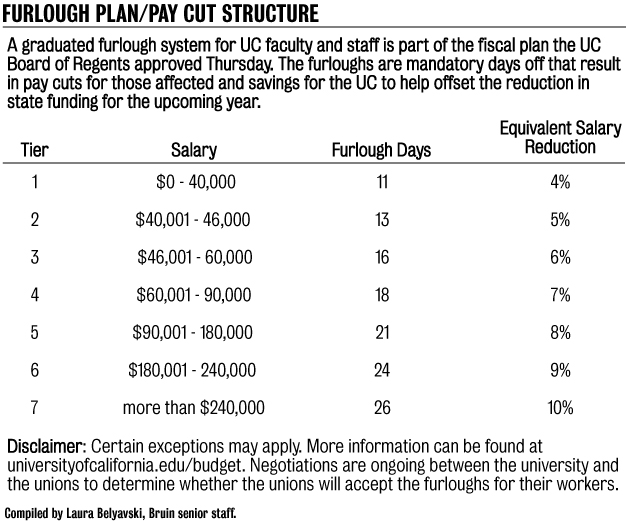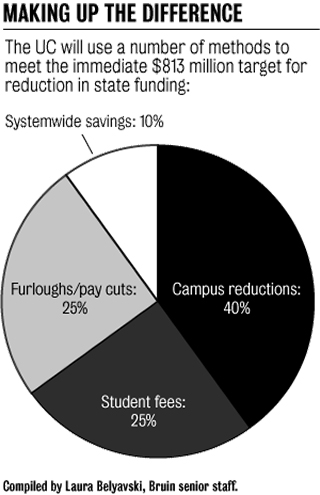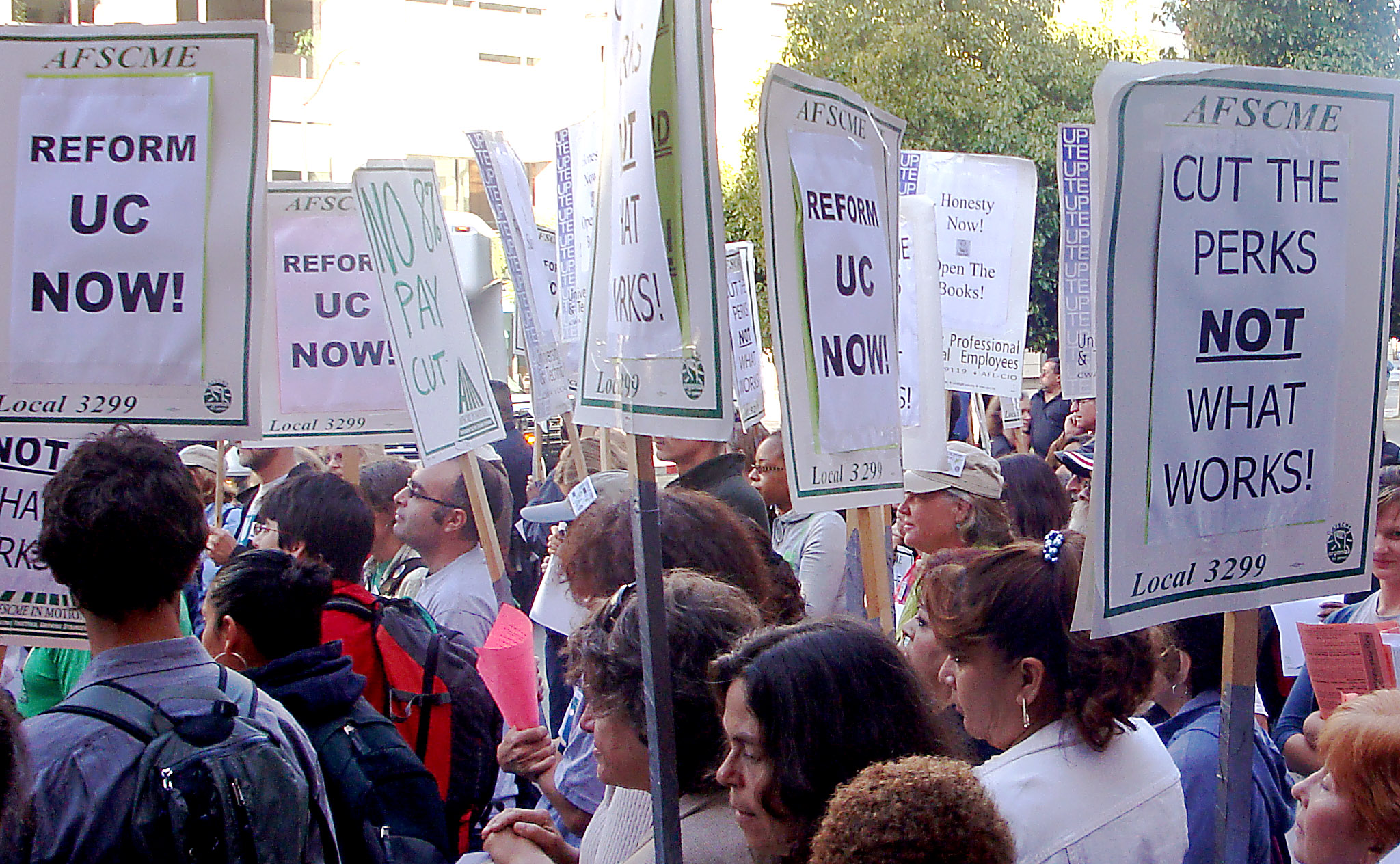

In early June, University of California President Mark Yudof proposed his initial pay-cut plan, and a group of UC Santa Cruz junior faculty members discussed their responses over coffee.
On July 15, the fruits of what began with that frustrated discussion were presented to the UC Board of Regents in the form of a letter to Gov. Arnold Schwarzenegger and California state legislators, stating the dangers of disinvesting in the University of California.
Largely written by Mark Krumholz, an assistant professor of astronomy and astrophysics at UC Santa Cruz and edited by Sandra Faber, a professor in the same department, the letter was signed by more than 300 UC faculty representing the National Academy of Engineering, the National Academy of Sciences and the Institute of Medicine.
On July 15, Faber and Krumholz traveled from Santa Cruz to the regents meeting at UC San Francisco with about 15 of the letter’s signatories to present their fears and concerns to the board.
The next day, the regents voted 20-1 to approve the proposed fiscal plan, including the furloughs, or mandatory unpaid days off, for UC faculty and staff. The result is that those affected are facing 4 to 10 percent pay cuts, depending on salary level. The plan uses a seven-tier, graduated furlough system so that those with the lowest salaries receive the fewest furlough days and vice versa.
The UC still must negotiate with the unions to reopen their contracts so union-represented staff can shoulder part of the burden. Yudof expects the negotiating process to take approximately 60 days, he said.
In response to fiscal plan, Faber said that if the proposed cuts are maintained for more than one year, the UC as it exists now will begin to collapse.
The university is facing an immediate crisis, using furloughs to cover 25 percent of the $813 million decrease in state funding, but professors have expressed concern about the future of the university.
When asked if she would consider leaving the university, UCLA professor and researcher Juli Feigon, a signatory on the letter to Schwarzenegger, said, “At this point? If it put me in a better situation for funding and for quality of students, people in my lab, yes, in fact. I think a lot of people think that way.”
She added that the model of the UC was to make higher education at a top university available to all qualified students at a decreased cost, and that model is basically vanishing.
Feigon mentioned the realities of education at UCLA in particular for this year: larger classes, fewer teaching assistants, less support from the university for education and higher student fees.
“How can (the quality of education) do anything but decrease?” she said.
UCLA professor David Eisenberg, another signatory on the letter, said that he is highly committed to the University of California after 40 years at UCLA.
“What concerns me now is that the University of California is losing its top position in terms of the education and research opportunities that it can provide and in losing that position we will have a less powerful man-power pool and the industries of California will do less well,” Eisenberg said.
This echoes Faber’s sentiments. She said that the three major locations of industry ““ Silicon Valley, Los Angeles and San Diego ““ are all built around UC schools and that those universities attract students who then settle there to start businesses and create jobs.
These professors fear that the first step in the deterioration of the UC, after the budget cuts, will be the departure of the best faculty. If that happens, soon after that, the UC will have trouble attracting the best students, Eisenberg said.
Krumholz said that when he decided to attend UC Berkeley for his doctoral degree, he chose it over Harvard. When he chose to teach and do research at UC Santa Cruz, it was his first choice, and he accepted the offer before hearing from the other places at which he had applied.
“If I were deciding today, I don’t think Santa Cruz would be my first choice,” he said, exemplifying the fear that the UC will not be able to recruit and retain the best faculty in the face of the budget cuts.
Although Krumholz did not speak about specific job offers, he said, “I have gotten the impression that if I wanted to leave, it would not be hard to do so.”
Krumholz added that while the amount of faculty leaving this year will only be a “trickle, … if the institution isn’t turned around, next year it’ll be a flood.”
However, Yudof is not discouraged and maintained a positive outlook at last week’s regents meeting.
“I just wish everybody in the UC community … could see how hard this guy, President Yudof, is working,” said Peter King, media director of the UC Office of the President.
The UC Regents are trying to find ways to maintain the quality of the UC, even if the state’s financial crisis continues.
On Thursday, Regents Chairman Russell Gould launched the Commission on the Future of the UC. Gould will co-chair the commission with Yudof.
While furloughs are meant to help the UC face the current shortages, the Commission on the Future of the UC is meant to find ways to maintain the excellence of the UC in spite of the state economic crisis, King said.
“It’s chartered to look at long-term solutions,” said student Regent Jesse Bernal, who was invited to serve on the commission.
The commission will consider all avenues to find funding in order to maintain the excellence of the UC, Bernal said.
One suggestion proposed by Lt. Gov. John Garamendi at the regents meeting is for the regents to endorse AB 656, a bill now circulating in the state legislature that would impose an oil severance tax of 9.9 percent on the extraction of oil from California land or water.
If passed, AB 656 would go into effect Jan. 1, 2010, and the taxes would be distributed among the UC, the California State University and the California Community Colleges.
“As an individual, I support it,” Bernal said.
Faber also suggested that one way to free the university from dependency on state politics would be to accept more out-of-state students to the UC. She referenced a paper co-authored by UC San Diego professor Michelle White that states the benefits of doing just that.
Students who attend public universities in other states have the same likelihood to stay in that state as residents and taxpayers, and the state collects more student-fees revenue in the short run, White said.
“What are we going to start saying to (Californians) if their spots are filling up increasingly by others? And I ask it as a question,” King said.
“It’s just one of the things that has to be wrestled with. This is a stewardship of an enterprise that’s been going on since the 1860s,” he added.
Nevertheless he said that the new commission will be looking at all options.
“California is an enduring place. … It tends to figure things out. It tends to get back up off its knees,” King said.
Bernal also expressed his faith in Yudof and the future of the UC.
“As hard as it is, we need to be a little patient right now,” Bernal said.
